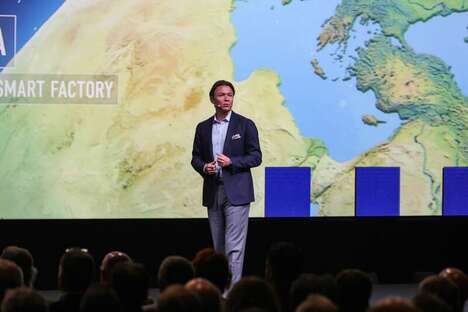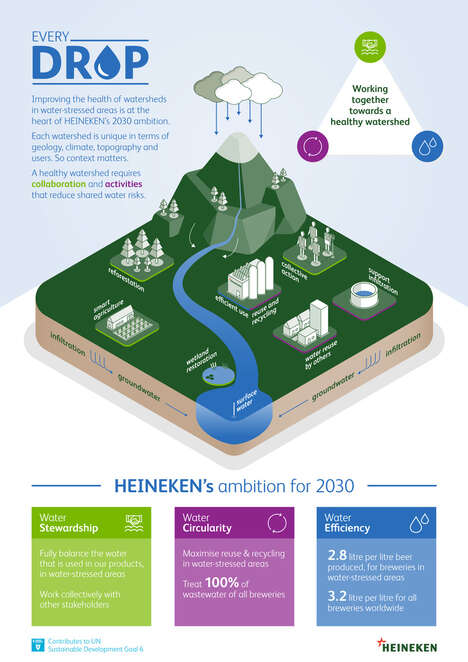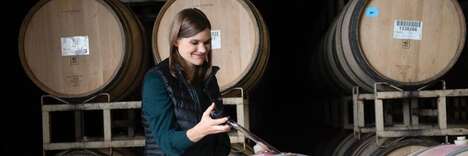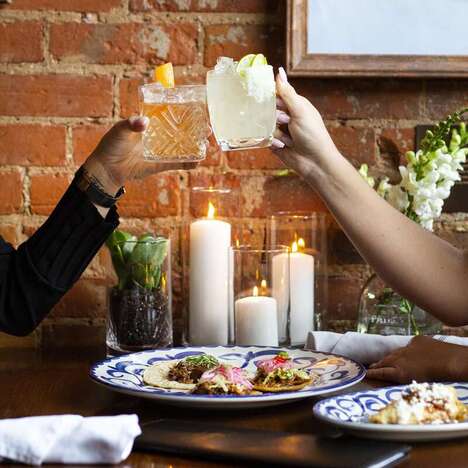The Swiss Army Knife of Agriculture
An Interview with Brandi DeCarli, CEO of Farm from a Box (VIDEO)
play_circle

Among the many start-ups that are attempting to instill change in this area is Farm from a Box who produces “modular off-grid toolkits for sustainable agriculture.” Focused on the US market, product stimulates local food production and also delivers a strong impact on the global food system, as well. In the box--which is a shipping container—one can find various technologies for water-efficient drip irrigation, 3kW solar power, Cloud-based data control, internal cold storage, and more. Trend Hunter spoke to CEO of Farm from a Box, Brandi DeCarli, about her initiative, the future of agriculture, and the role technology plays in it.
How important is innovation in agriculture and how has the industry changed over the past little while?
The AgTech space is one of the most rapidly growing sectors and it has to be. On one hand, consumers are actually changing the way they choose, prepare and consume food. They have become more knowledgeable and a lot of them want to know where what they are eating is growing, how it is growing and whether it is safe for consumption. On the other hand, there is a huge push to get back to the land, which results in people wanting to do some of their own farming. In addition, if we look at what is happening in the global sector, it is absolutely necessary for us to change our agricultural production methods—from how we produce to how we ship. This is motivated by factors like climate change, resource degradation, and so on.
The old ways are unraveling as the whole food system changes at a rapid pace. The last big revolution in agriculture was mechanizations, which brought about tractors and the like. It was really about industrializing our processes to produce a lot more yields, but this really came at a high cost from an environmental perspective, as well as that of the distribution channels. Today, we are aiming to take what we learned from the previous effort of industrialization and to use technology to reframe that knowledge to allow the process to be more localized, sustainable, and efficient.
How did Farm from a Box come to be?
Farm from a Box was conceived after my business partner and I were in Kenya, building a youth empowerment center with modified shipping containers. The whole purpose of the project was to bring resources into a community that was really lacking access to them. It was predominantly set around education, health, and sports. It was painfully obvious to us that the access to healthy food needed to be addressed in this community, as well. We decided to utilize the model of the deliverable shipping container system and outfit it to produce food on-site, directly for the community, without needing to tap wi-fi, grid access, or even water. This was really the genesis of Farm from a Box.
Our innovation takes cues from the internal hydroponic containerized food system, but we flipped it inside-out. We used the shipping container to bring in all the core components to support an off-grid outdoor farm, including solar-powered pumping, drip irrigation, and filtration, internal cold storage, wi-fi connectivity. It is a whole data suite packaged into one system. I’d like to refer to it as the Swiss army knife of food independence.
It started from the lens of how we can approach food aid differently and it is not only about providing short-term solutions, but we are also attempting to tackle the problem of infrastructure and distribution. Throughout the Farm from a Box journey, we have found that our innovation applies to a lot of different communities and scenarios—from strengthening local food hubs within North America to bringing schools in more rural regions access to healthy food. It also brings a STEM education component. When it comes to farm-from-table or corporate headquarters, we’re seeing a lot of different uses for our infrastructure.
How has Farm from a Box disrupted the industry?
There are two main innovative components that we bring to agriculture. One is our holistic approach. There are solutions out there that address irrigation and water movement, others address IoT, power and so on. Farm from a Box took all of those components to make one holistic system out of it, which makes us really unique in the industry that we are in. The other thing is that we are working on a community-based sizing, while most tech innovation in agriculture is usually for very large-scale farms. We are bringing the best of clean tech to small and medium-sized farms—anywhere between the one hectare to six hectares—which is usually a space where tech and innovation don’t necessarily get into, but that is where most of our global food production is.
Not only are tech and innovation crucial to contemporary and future agriculture, but they also should be made accessible to the masses. We are trying to democratize the access to this technological infrastructure for everyone, including refugee communities and commercial farms. Actually, our very first sale was really exciting and encouraging. It was to the UN and we did it through a partnership with the World Food Program. The project entailed bringing in technology to impact host communities, their nutritional score and what their food consumption rate was. What we did came out as much more than that because we provided access to the training and a way for them to increase their income and we ultimately pulled the community together to form a legal farmers cooperative. Now they are acting as a business, as well. So, there were a number of impact points that we ended up hitting throughout this project—from the linear targets that were concerned with dietary diversity to secondary social impacts like knowledge transfer and empowerment.
What are the obstacles you face with tech and the IoT?
With regard to the access issue, one of the challenges that we should absolutely be aware of is that technology is often developed with a certain segment of the population in mind. This creates a big possibility of leaving a large portion of our global population outside of that technological innovation, which creates a bigger gap on both the economic and production side. We need to make sure that we are developing technologies that have the potential to empower the masses, not just one segment.
There also continues to be growth in the indoor production space, with different robotics and automated systems being deployed. I am concerned about the fact that many focus on these innovations and fail to pay attention to sun and soil agriculture, which remain very important to battling climate change, food nutrition, water pollution and ensuring accessibility. Even though the AgTech space is being developed, we still need to stress classic planted agriculture because it can literally sequester carbon from the atmosphere. The shift to indoor production entails a lot of efficiencies and assures a controlled climate, but we need to make sure that innovation is also geared toward soil crop-based growth and supporting it after the degradation that it has been through.
What is the advantage that a woman-owned business can offer?
The benefit is that we apply a different approach, one that is very solution-based, and look at things from a different perspective. Developing technology for the masses, for example, is something I feel is really inline with what other female founders want to achieve. Some of the global food production is grown by women farmers and yet, they don’t have access to the technology that they need, nor do they have access to land rights. There still exists a massive gender gap in this space and in order to solve it, I think you need diversity in the business environment, as well. I think more women in the AgTech space will help solve this.
How are conferences like the SheEO Summit beneficial to businesses like Farm from a Box?
Even in other conferences that I attend, I talk about SheEO. It’s such an impactful initiative and it offers such a unique approach. During the very first SheEO event I attended, there were a lot of CEOs, vendors, and fellow entrepreneurs coming up and offering support. I had this initial hesitancy to accept their help because I am so used to people offering help but wanting founder’s stock or something else in return. With SheEO, it was a completely different experience, however. Other attendees were legitimately interested in helping each other further their growth, whether it is through sharing resources or providing you with networking opportunities. They didn’t want anything in return, they wanted to foster your growth. It was definitely a paradigm shift for me.
They really go above and beyond in terms of funding for women-led companies, but they also align you with mentorship opportunities. All of the sudden, you have someone there to support you as you create new strategies and identify problems in your business model. It allows you to check in on a base level, versus only through balance sheets. SheEO is really a place where a healthy and empowering community thrives.
How do you think the agricultural industry will change in the next 10 years?
Technology will continue to play a front-facing role, but I think that there will also be this big resurgence of more naturally based agricultural production--there is going to be growth in terms of regenerative naturally based growing systems. It has to happen! A lot of people are starting to take their food into their own hands, which is innately going to start changing the way that even large scale production is done. Aside from that, transparency will also continue to play a huge role as people asks themselves about the origin of their food, the processes it underwent, the treatment of employees during the production process and so on. Some people have already started asking themselves these questions already.
References: farmfromabox, linkedin
Featured Articles

Building the Sustainable Business Mandate
An Interview with Hakan Bulgurlu, the CEO of Arçelik

Evolving Sustainable Practices
Blanca Juti Spoke with Us to Explain HEINEKEN's 2030 Water Vision

Learning Skills for Employability
An Interview with Jennifer Flanagan, CEO of Actua

Deciphering Food Trend Reports
foodora's Head of Marketing, Matt Rice, Expands on 2019 Food Trends

Sustainability Through Distilling
A Talk with Cam Formica, Co-Founder of Willibald Farm Distillery

Focusing on Value and Sustainability
An Interview with Mindfull Inc. Founder and CEO, Matt Jimenez

Sustainable Winemaking Practices
An Interview with Katie Jackson, Vice President of Sustainability

Defining Brand Heritage
An Interview with Patrón Brand Education Manager, Mariana Sanchez Benitez

Applying AI in Public Sectors
A Talk with Ott Velsberg, Chief Data Officer of Estonia's Government